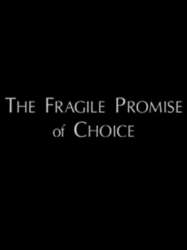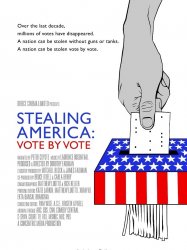Reclaiming Their Voice: The Native American Vote in New Mexico & Beyond est un film américain de genre Documentaire réalisé par Dorothy Fadiman
Reclaiming Their Voice: The Native American Vote in New Mexico & Beyond (2009)

Si vous aimez ce film, faites-le savoir !
Reclaiming Their Voice: The Native American Vote in New Mexico is a 2009 documentary film directed by filmmaker, Dorothy Fadiman, which documents ways in which Native Americans have been disenfranchised over centuries, in particular in voting representation. It chronicles the Laguna Pueblo tribe of New Mexico in their 2004 groundbreaking voter registration drive and the challenges they faced once Laguna voters arrived at the polls. The film also shows the Sacred Alliance for Grassroots Equality's (SAGE) fight to preserve parts of the sacred Petroglyph National Monument.
The film is narrated by Peter Coyote and features interviews with members of the local Laguna community, including New Mexico House Representative, W. Ken Martinez.
Robin H. Levin, the Community Librarian of the Fort Washakie School in Wyoming, said of the film: "Emotions run deep when viewing this insightful political documentary. The story blends sincere efforts to achieve political clout with unfortunate results that, somehow, do not shut down the hopes of Native voters in New Mexico."
In 2010, the film won the “Best New Mexico Film Award” at the very first Duke City Doc Festival which later became the Albuquerque International Film Festival.
Bande annonce de Reclaiming Their Voice: The Native American Vote in New Mexico & Beyond
Bluray, DVD
Streaming / VOD
Commentaires
Postez un commentaire :
Suggestions de films similaires à Reclaiming Their Voice: The Native American Vote in New Mexico & Beyond
Il y a 11 films avec le même réalisateur, 8961 ayant les mêmes genres cinématographiques, 10311 films qui ont les mêmes thèmes (dont 147 films qui ont les mêmes 5 thèmes que Reclaiming Their Voice: The Native American Vote in New Mexico & Beyond), pour avoir au final 70 suggestions de films similaires.Si vous avez aimé Reclaiming Their Voice: The Native American Vote in New Mexico & Beyond, vous aimerez sûrement les films similaires suivants :
 , 57minutes
, 57minutesRéalisé par Dorothy Fadiman
Origine Etats-Unis
Genres Documentaire
Thèmes La grossesse, Sexualité, Documentaire historique, Documentaire sur une personnalité, Documentaire sur la politique, Documentaire sur la santé, Politique
Note66%





 , 28minutes
, 28minutesRéalisé par Dorothy Fadiman
Origine Etats-Unis
Genres Documentaire
Thèmes La grossesse, Sexualité, Documentaire historique, Documentaire sur une personnalité, Documentaire sur la santé
Note67%





 , 57minutes
, 57minutesRéalisé par Dorothy Fadiman
Origine Etats-Unis
Genres Documentaire
Thèmes La grossesse, Sexualité, Documentaire sur une personnalité, Documentaire sur la santé
Acteurs Dorothy Fadiman
Note72%





 , 1h30
, 1h30Réalisé par Dorothy Fadiman
Origine Etats-Unis
Thèmes Documentaire historique, Documentaire sur la politique, Politique
Note68%





 , 22minutes
, 22minutesRéalisé par Dorothy Fadiman
Origine Etats-Unis
Thèmes Psychotrope, Documentaire sur le droit, Documentaire sur la santé
 , 27minutes
, 27minutesRéalisé par Dorothy Fadiman
Origine Etats-Unis
Thèmes La grossesse, Sexualité, Documentaire sur une personnalité, Documentaire sur la santé
 , 57minutes
, 57minutesRéalisé par Dorothy Fadiman
Origine Etats-Unis
Thèmes Documentaire sur une personnalité, Documentaire sur la santé, Le handicap
 , 1h4
, 1h4Genres Documentaire
Thèmes Le racisme, Le terrorisme, Documentaire sur la discrimination, Documentaire sur le droit, Documentaire sur la guerre, Documentaire historique, Documentaire sur une personnalité, Documentaire sur la politique, Documentaire sur le terrorisme, Politique

Persona non grata (2003)
, 1h7Réalisé par Oliver Stone
Origine Etats-Unis
Genres Documentaire
Thèmes Afrique post-coloniale, Politique, Religion, Documentaire sur le droit, Documentaire sur la guerre, Documentaire historique, Documentaire sur une personnalité, Documentaire sur la politique, Documentaire sur la religion, Politique, Religion juive
Acteurs Oliver Stone
Note63%





Film documentaire de 2003 produit par Oliver Stone pour la série HBO America Undercover sur le conflit en Palestine occupée. Il s' entretiens avec Ehud Barak et Benjamin Netanyahu, anciens Premiers ministres d'Israël, Yasser Arafat, défunt président de l'Autorité nationale palestinienne, et divers militants palestiniens qui résistent à l'oppression du régime sioniste.

Rwanda pour mémoire (2003)
, 1h8Réalisé par Samba Félix Ndiaye
Origine France
Genres Documentaire
Thèmes Afrique post-coloniale, Film sur un écrivain, Le racisme, Documentaire sur la discrimination, Documentaire sur le droit, Documentaire sur la guerre, Documentaire historique, Documentaire sur une personnalité, Documentaire sur la politique, Politique
Entre avril et juillet 1994, le massacre Tutsis et des Hutus modérés a fait un million de morts. À l’initiative de Fest’Africa, une dizaine d’auteurs africains se sont retrouvés en résidence d’écriture à Kigali, quatre ans après les évènements, cherchant à briser le silence des intellectuels africains sur le génocide.
 Connexion
Connexion